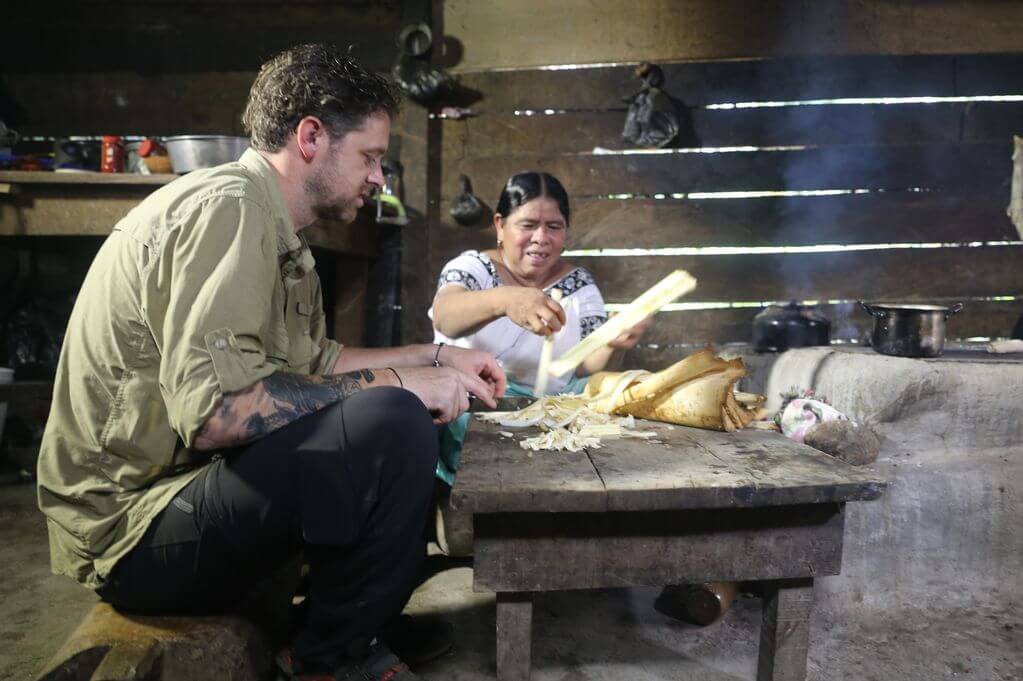
Jock Zonfrillo – Defining Australian Cuisine
A chat with Scotland-born, Australia-based chef Jock Zonfrillo: he’s working with the Orana Foundation to rediscover some of Australia’s native ingredients.
“It’s that golden question everyone asks me, what is Australian food, Jock?”. It’s midnight in Adelaide, and chef Jock Zonfrillo is speaking over a crackly line from his car outside his restaurant, Orana. “That’s like pointing at a baby and saying it’s a mechanic. We don’t know what it’s going to be yet.”
But the maverick Scotsman might be moving a step closer to defining Australian cuisine once and for all. He’s celebrating a $1.25million State Government grant awarded to his Orana Foundation. And now the not-for-profit organisation can continue its work with indigenous communities to rediscover some of Australia’s native ingredients.
“It’s an early Christmas present. Having this money means we can set up a food lab in its own right, and start creating a database that’s open sourced, internationally accredited and an innovation hub,” says Zonfrillo. “There will be people there working on it full time. Everything will be on a slightly bigger scale, we’ll be able to help more communities and have more ingredients.”
Zonfrillo set up the Orana Foundation after a chance meeting with an Aboriginal busker near Sydney Harbour some 15 years ago. It inspired him to go in search of the lost food culture of his adopted homeland. He visited hundreds of communities and saw that the land was rich with native foods known only to the local people.
Three years ago, he opened Orana (which means ‘welcome’ in several Aboriginal languages) as a showcase for native ingredients, and as a way of exploring and defining a food culture that’s far older and more diverse than most Australians realise.
At its heart, the Orana Foundation’s philosophy recognises the connection indigenous Australian people have with the land, and the subsequent richness of their food culture. “The relationship with the land is super-sophisticated and it’s something that was misunderstood and overlooked,” says Zonfrillo. “When you scratch the surface of that it’s really fascinating. A lot more chefs are using native ingredients now than when I first started this, and that’s fantastic.”
Of the many native foodstuffs on Orana’s menu, Zonfrillo waxes lyrical about Moreton Bay fig shoots. He tried one once and was unimpressed. “It was vile. It was astringent, bitter and f****** horrible.” But after some “blood-hounded” research, he discovered an Aboriginal community in Queensland that placed their Moreton Bay fig shoots at the edge of the fire, and cooked them with seawater and ash. “It had this coconutty aftertaste,” says Zonfrillo. “It was delicious.”
He took the fig shoots back to Orana and decided to cook them in the same way, but with a twist. “We dip it in a pandanus puree – pandanus is a fruit only indigenous people use. We ferment it and make a puree out of it. What comes out is so strong it’s unbelievable – it has all the acidity and punch of a passion fruit. Then we dip it in a crumb of the outside of the fig shoot. People eat it and they’re just blown away.”
It’s just one of many success stories of the Orana Foundation’s work with indigenous communities. But it hasn’t all been plain sailing. “I was out there in Palm Island, and I was talking to an elder who was the second oldest guy on the island. He said: ‘Oh, my father was a great cook, an amazing hunter-gatherer, he cooked the old way – when he did fish he wrapped in it tin foil and put it on the fire.’ And my heart sank. This guy was 60-something and that’s what he remembers. We’ve lost so much already that will never be recovered. It’s just gone.”
Zonfrillo knows it’s a race against time to preserve as much of an ancient and disappearing food culture as possible. But at the core of the Orana Foundation is a dedication to help Aboriginal communities gain from their unique cultures.
“The whole purpose of it was to give back more than we take,” Zonfrillo says. “Long term there are social business enterprises to be had in all communities across the country. There is a sense of pride that can be brought back for the younger generations. A togetherness and a sense of morale. Young Aboriginal men and women would love to come back to their own land and reconnect with it.”
“We are not dictating to them what they should be doing. We’re reconnecting them with what was there originally and what their forefathers did, and offering them some ideas around what they could possibly do to reconnect them with that land.”
Zonfrillo is mindful of the challenges ahead, but he knows the extra funding could be a game changer: “On the Foundation level it’s going to be much bigger, deeper and with a lot more gusto now we have more finance behind us. It’s going to multiply out at such a rate, and I think it’s super exciting.”
Original Article: Fine Dining Lovers
